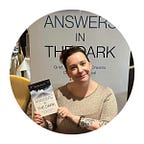Why Grief is Not a “Lesson” Even If It Helps Us Grow.
This article discusses bereavement including briefly mentioning loss of a child.
There is a gorgeous book called ‘Why Bad Things Happen to Good People’ by a Rabbi called Harold Kushner. In the pages, he offers that even though loss made him a better spiritual advisor, he would have his son back in a heartbeat.
This reminds us that bereavement isn’t a “lesson”; it’s something we must learn to navigate.
That we don’t “deserve” the horrors we face – we didn’t “need” it in order to be “better people” – we were already good enough.
But society tells us so and I think it’s time we stopped endorsing that.
I know the “lesson” narrative may be helpful to some but, for me, it’s more about how we learn to cope in healthy ways. It feels important that we don’t make people feel worse, at some of the most difficult times in their lives.
Telling someone they “needed” what they’ve been through, suggests they should just get on with it.
But it doesn’t work like that. Grief and loss are deeply personal experiences. Each of us navigates the pain we endure in different ways, sometimes healthy, sometimes not. And some of that depends on how the people around us help and support us.
We tell the bereaved to “move on” in so many subtle ways because their pain makes us uncomfortable.
Grief IS transformational
So we didn’t need the “lesson”, but we may grow from our experience. We don’t have to be “grateful” for it, but we can accept it happened. We can find our way forward, but we don’t forget.
Telling a grieving person “it must have happened for a reason” is only helpful to them if they align with that philosophy. To imply they “needed it” is just another way we shame and blame people for their pain.
Instead, I think it’s more important to acknowledge they’re hurting.
Rather than offering a cliché, we could say “I’m so sorry this is happening”. We don’t need to project our notion of what we think helps, instead we could ask “What do you need today?” Empower people to cope, without implying they’re failing at it.
There are lots of ways we can help people when times are hard, but implying they “deserved” it is never ok.
I’ve spoken with grieving people for more than 20 years. Here’s three things they’d rather we didn’t say.
Delphi is the author of Answers In The Dark: Grief, Sleep and How Dreams Can Help You Heal out now on Amazon and Hive.
